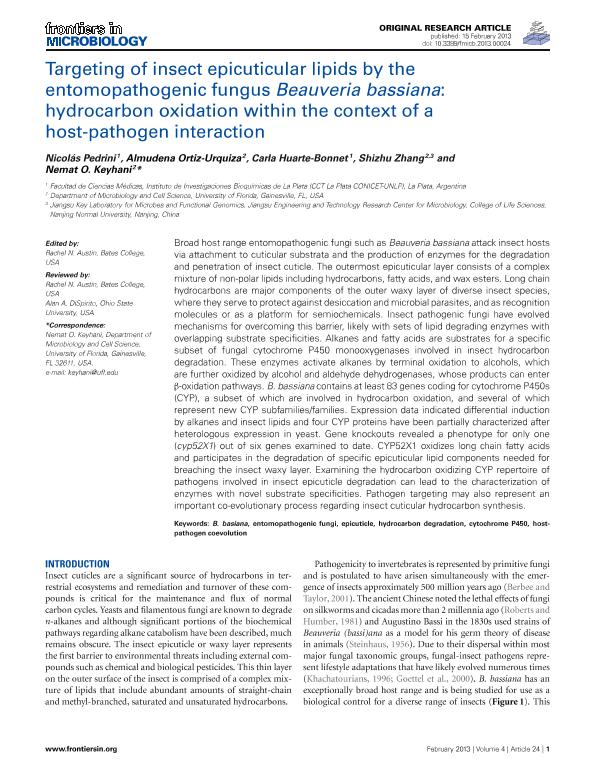Mostrar el registro sencillo del ítem
dc.contributor.author
Pedrini, Nicolás

dc.contributor.author
Ortiz Urquiza, Almudena
dc.contributor.author
Huarte Bonnet, Carla

dc.contributor.author
Zhang, Shizhu
dc.contributor.author
Keyhani, Nemat O.
dc.date.available
2017-09-13T14:38:31Z
dc.date.issued
2013-02-15
dc.identifier.citation
Pedrini, Nicolás; Ortiz Urquiza, Almudena; Huarte Bonnet, Carla; Zhang, Shizhu; Keyhani, Nemat O.; Targeting of insect epicuticular lipids by entomopathogenic fungi: hydrocarbon oxidation within the context of a host-pathogen interaction; Frontiers Media S. A; Frontiers in Microbiology; 4; 15-2-2013; 1-18
dc.identifier.issn
1664-302X
dc.identifier.uri
http://hdl.handle.net/11336/24118
dc.description.abstract
Broad host range entomopathogenic fungi such as Beauveria bassiana attack insect hosts via attachment to cuticular substrata and the production of enzymes for the degradation and penetration of insect cuticle. The outermost epicuticular layer consists of a complex mixture of non-polar lipids including hydrocarbons, fatty acids, and wax esters. Long chain hydrocarbons are major components of the outer waxy layer of diverse insect species, where they serve to protect against desiccation and microbial parasites, and as recognition molecules or as a platform for semiochemicals. Insect pathogenic fungi have evolved mechanisms for overcoming this barrier, likely with sets of lipid degrading enzymes with overlapping substrate specificities. Alkanes and fatty acids are substrates for a specific subset of fungal cytochrome P450 monooxygenases involved in insect hydrocarbon degradation. These enzymes activate alkanes by terminal oxidation to alcohols, which are further oxidized by alcohol and aldehyde dehydrogenases, whose products can enter β-oxidation pathways. B. bassiana contains at least 83 genes coding for cytochrome P450s (CYP), a subset of which are involved in hydrocarbon oxidation, and several of which represent new CYP subfamilies/families. Expression data indicated differential induction by alkanes and insect lipids and four CYP proteins have been partially characterized after heterologous expression in yeast. Gene knockouts revealed a phenotype for only one (cyp52X1) out of six genes examined to date. CYP52X1 oxidizes long chain fatty acids and participates in the degradation of specific epicuticular lipid components needed for breaching the insect waxy layer. Examining the hydrocarbon oxidizing CYP repertoire of pathogens involved in insect epicuticle degradation can lead to the characterization of enzymes with novel substrate specificities. Pathogen targeting may also represent an important co-evolutionary process regarding insect cuticular hydrocarbon synthesis.
dc.format
application/pdf
dc.language.iso
eng
dc.publisher
Frontiers Media S. A
dc.rights
info:eu-repo/semantics/openAccess
dc.rights.uri
https://creativecommons.org/licenses/by-nc-sa/2.5/ar/
dc.subject
B. Bassiana
dc.subject
Entomopathogenic Fungi
dc.subject
Epicuticle
dc.subject
Hydrocarbon Degradation
dc.subject
Cytochrome P450
dc.subject
Host-Pathogen Coevolution
dc.subject.classification
Bioquímica y Biología Molecular

dc.subject.classification
Ciencias Biológicas

dc.subject.classification
CIENCIAS NATURALES Y EXACTAS

dc.title
Targeting of insect epicuticular lipids by entomopathogenic fungi: hydrocarbon oxidation within the context of a host-pathogen interaction
dc.type
info:eu-repo/semantics/article
dc.type
info:ar-repo/semantics/artículo
dc.type
info:eu-repo/semantics/publishedVersion
dc.date.updated
2017-08-29T19:57:12Z
dc.journal.volume
4
dc.journal.pagination
1-18
dc.journal.pais
Suiza

dc.journal.ciudad
Lausana
dc.description.fil
Fil: Pedrini, Nicolás. Consejo Nacional de Investigaciones Científicas y Técnicas. Centro Científico Tecnológico Conicet - La Plata. Instituto de Investigaciones Bioquímicas de La Plata ; Argentina
dc.description.fil
Fil: Ortiz Urquiza, Almudena. University of Florida; Estados Unidos
dc.description.fil
Fil: Huarte Bonnet, Carla. Consejo Nacional de Investigaciones Científicas y Técnicas. Centro Científico Tecnológico Conicet - La Plata. Instituto de Investigaciones Bioquímicas de La Plata ; Argentina
dc.description.fil
Fil: Zhang, Shizhu. University of Florida; Estados Unidos. Nanjing Normal University; China
dc.description.fil
Fil: Keyhani, Nemat O.. University of Florida; Estados Unidos
dc.journal.title
Frontiers in Microbiology
dc.relation.alternativeid
info:eu-repo/semantics/altIdentifier/url/http://journal.frontiersin.org/article/10.3389/fmicb.2013.00024/full
dc.relation.alternativeid
info:eu-repo/semantics/altIdentifier/doi/http://dx.doi.org/10.3389/fmicb.2013.00024
Archivos asociados
